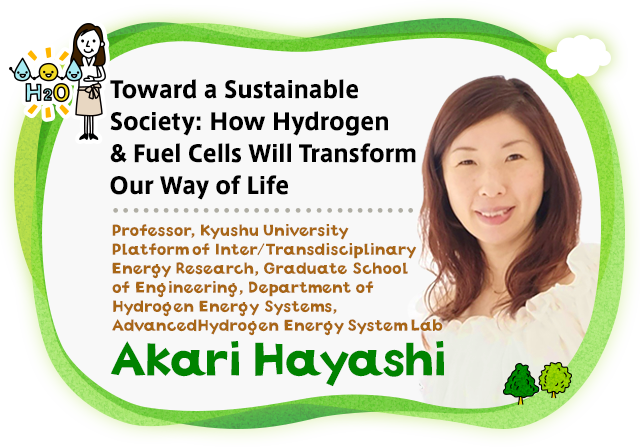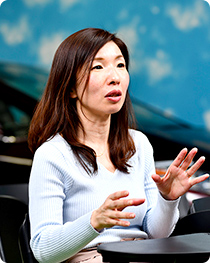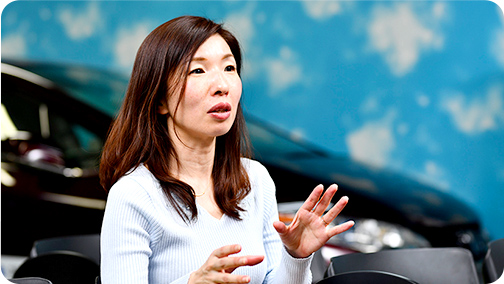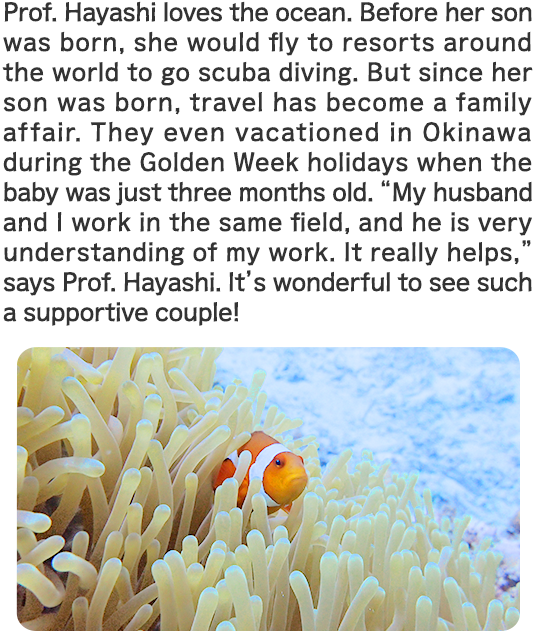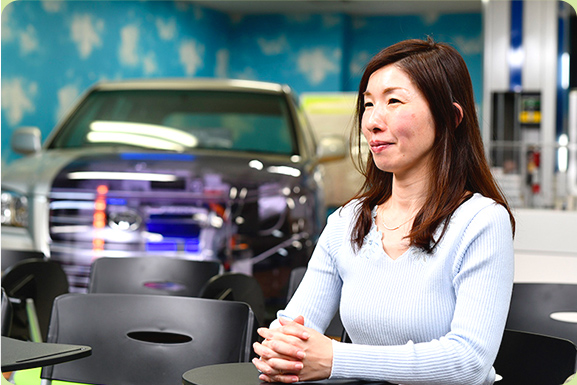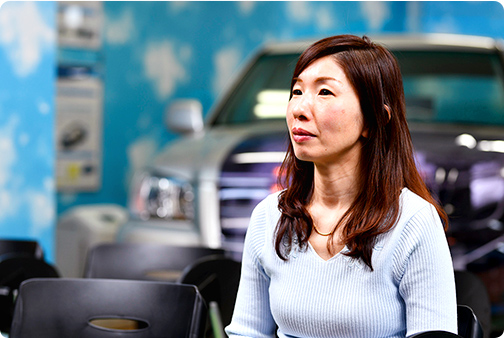 Professor Hayashi’s frank and candid manner is apparent in her every answer. Her students adore her, too, and call her an "extremely approachable professor." Despite being born in Osaka, she speaks without a hint of the Osaka dialect. “It seems that I lost my accent while I was studying abroad in the US,” she explains.
Professor Hayashi’s frank and candid manner is apparent in her every answer. Her students adore her, too, and call her an "extremely approachable professor." Despite being born in Osaka, she speaks without a hint of the Osaka dialect. “It seems that I lost my accent while I was studying abroad in the US,” she explains.
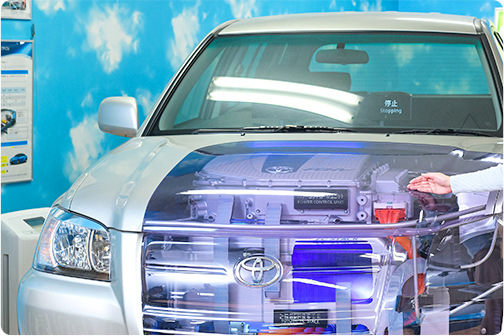 The Hydrogen Society Showroom was created to allow visitors to see, hear, and experience hydrogen energy technology. Visitors can compare brand-name fuel cell vehicles and home-use fuel cells (nicknamed “ene-farms” in Japan), try their hand at filling a hydrogen tank at the dispenser, or see a diorama model of what a hydrogen society might look like in 2030.
The Hydrogen Society Showroom was created to allow visitors to see, hear, and experience hydrogen energy technology. Visitors can compare brand-name fuel cell vehicles and home-use fuel cells (nicknamed “ene-farms” in Japan), try their hand at filling a hydrogen tank at the dispenser, or see a diorama model of what a hydrogen society might look like in 2030.
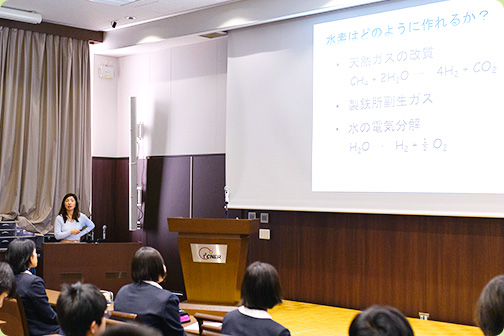 Professor Hayashi conducts lectures for high school students and the general public. Here she is seen explaining the concept of hydrogen energy to high school students.
Professor Hayashi conducts lectures for high school students and the general public. Here she is seen explaining the concept of hydrogen energy to high school students.
 Professor Hayashi’s frank and candid manner is apparent in her every answer. Her students adore her, too, and call her an "extremely approachable professor." Despite being born in Osaka, she speaks without a hint of the Osaka dialect. “It seems that I lost my accent while I was studying abroad in the US,” she explains.
Professor Hayashi’s frank and candid manner is apparent in her every answer. Her students adore her, too, and call her an "extremely approachable professor." Despite being born in Osaka, she speaks without a hint of the Osaka dialect. “It seems that I lost my accent while I was studying abroad in the US,” she explains.
Fuel cell technology is gaining widespread attention because it produces no carbon dioxide (CO2) emissions and is highly efficient, due to its direct conversion of chemical energy into electricity. A fuel cell is a device that generates electricity by a chemical reaction between hydrogen and oxygen. This electricity is commonly referred to as "hydrogen energy." Japan is dedicated to developing hydrogen energy technology in a bid to produce carbon-free energy for the world.
 The Hydrogen Society Showroom was created to allow visitors to see, hear, and experience hydrogen energy technology. Visitors can compare brand-name fuel cell vehicles and home-use fuel cells (nicknamed “ene-farms” in Japan), try their hand at filling a hydrogen tank at the dispenser, or see a diorama model of what a hydrogen society might look like in 2030.
The Hydrogen Society Showroom was created to allow visitors to see, hear, and experience hydrogen energy technology. Visitors can compare brand-name fuel cell vehicles and home-use fuel cells (nicknamed “ene-farms” in Japan), try their hand at filling a hydrogen tank at the dispenser, or see a diorama model of what a hydrogen society might look like in 2030.
Hydrogen energy may not yet be a household topic, but for years the Japanese government has worked with companies and universities to develop a whole range of products for its practical application. Take fuel cell vehicles, for example. Instead of gasoline engines, these cars have fuel cells and high-pressure hydrogen tanks located under the seats and hood. Toyota announced its fuel cell vehicle, the MIRAI, in December 2014, which is already commercially available in the United States. Honda has also launched the CLARITY, its own model of fuel cell vehicle. In Tokyo, fuel cell buses were introduced into the Toei Bus network in 2017, with five fuel cell buses currently in operation. In Nagasaki, the development of fuel cell boats has reached the final phases of testing. There are now 112 hydrogen stations in operation across Japan as of December 2019, and hydrogen energy technology is making remarkable progress. Fukuoka City has been particularly swift to focus on the future potential of hydrogen energy, proclaiming itself a “Hydrogen Leader City” in March 2015. There is no doubt that hydrogen energy will increasingly become part of our everyday lives.
 Professor Hayashi conducts lectures for high school students and the general public. Here she is seen explaining the concept of hydrogen energy to high school students.
Professor Hayashi conducts lectures for high school students and the general public. Here she is seen explaining the concept of hydrogen energy to high school students.
Fuel cell and hydrogen energy technologies are built upon the accumulated research and experiments of countless individuals across a wide range of academic fields. At Kyushu University’s Hydrogen Energy Education and Research Base, members work together in teams every day, each researching topics such as materials and integrated systems for fuel cells, and methods for efficient energy storage.
My field of expertise is electrodes, more specifically electrocatalysts, which determine fuel cell performance. Electrocatalysts improve the efficiency of the hydrogen-oxygen reaction that takes place in a fuel cell. I investigate different electrocatalysts, performing research and testing on their performance and degradation mechanisms before proposing potential applications. Repeated experimentation is necessary at the nanoscale (one nanometer is one-billionth of a meter), and the results are not something that has an immediate impact on our everyday lives. However, I firmly believe that the research I do today will have an impact tomorrow as we build the foundations for the hydrogen society to come. I have plans to continue my research through further collaboration with industry partners.
Detailed explanations of hydrogen energy available on the Ministry of Economy, Trade and Industry website:
https://www.enecho.meti.go.jp/category/saving_and_new/advanced_systems/hydrogen/ (Japanese)

![]()




